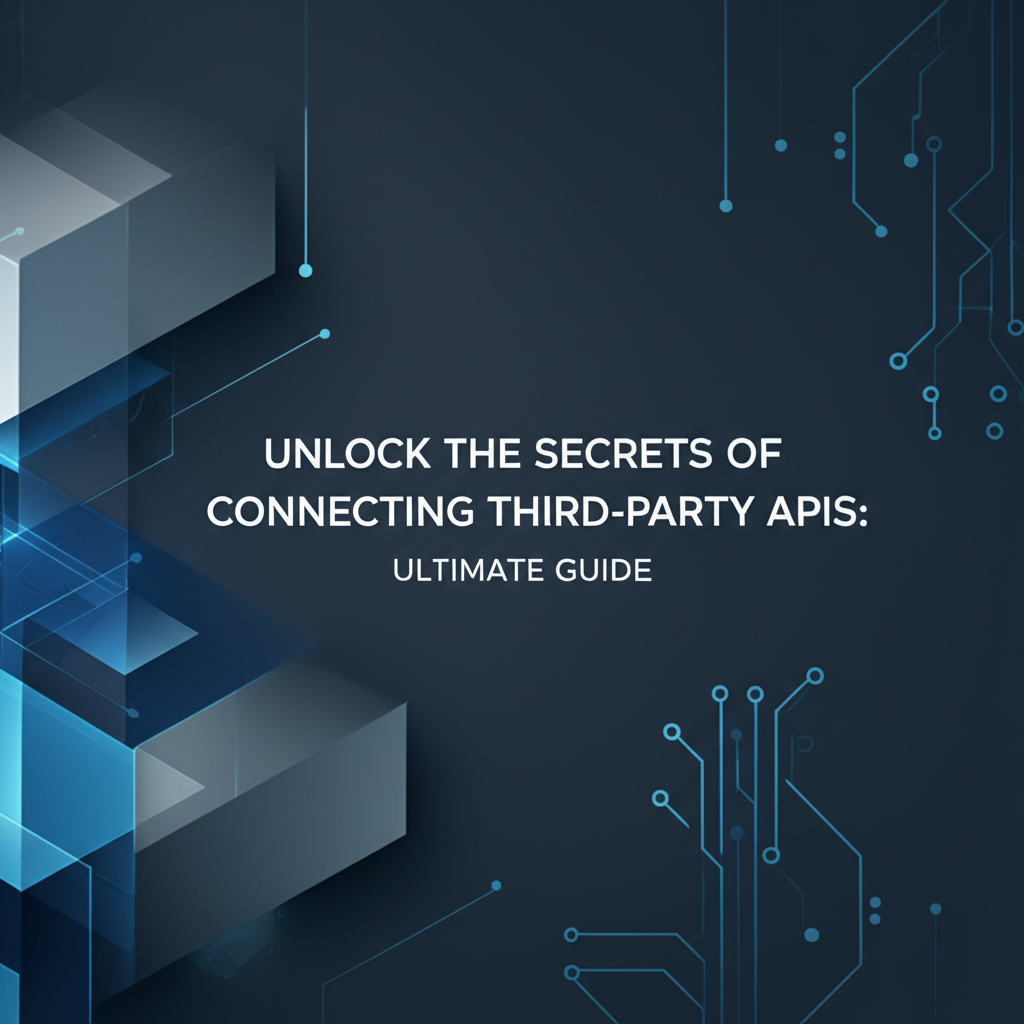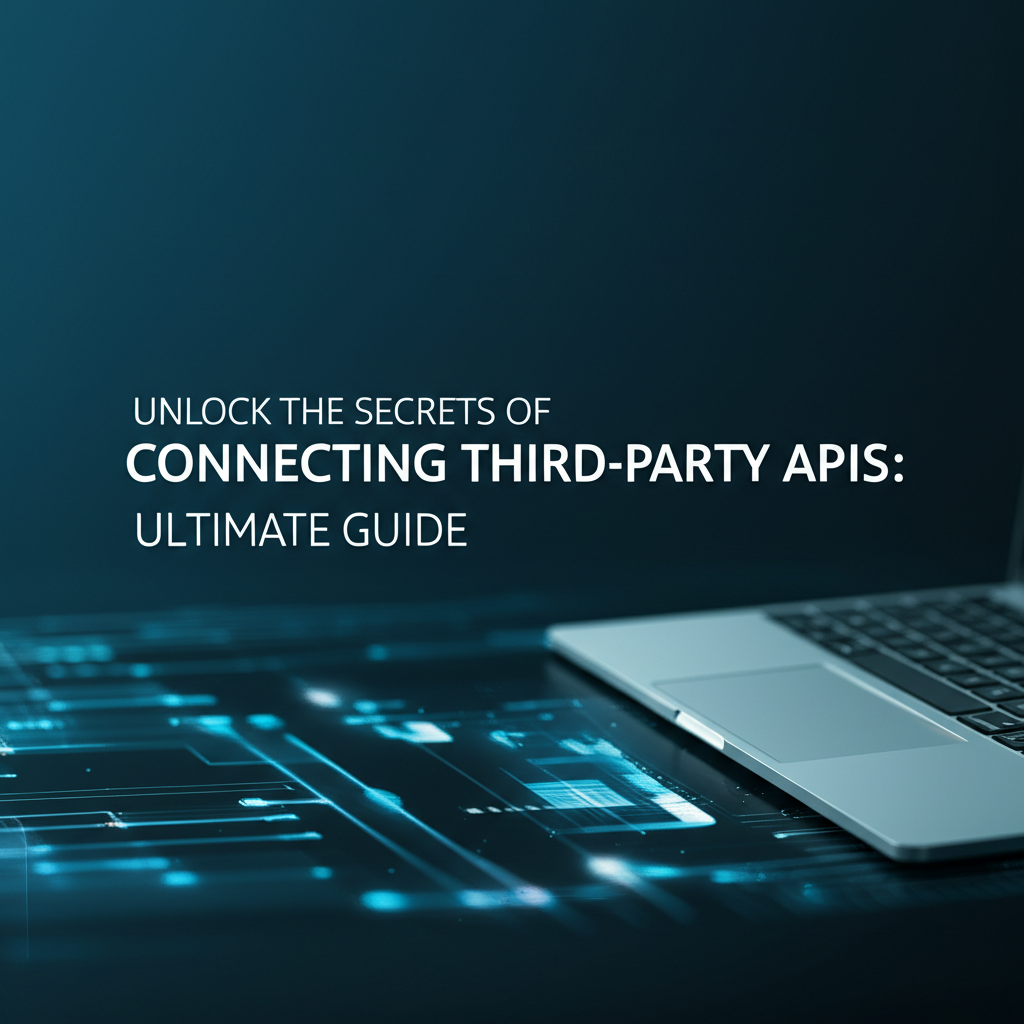Unlock the Secrets of Connecting Third-Party APIs: Ultimate Guide

Build AI Agents With Incredible MCP
Introduction
In today's digital landscape, the ability to seamlessly connect third-party APIs is a cornerstone of modern application development. APIs (Application Programming Interfaces) allow different software applications to communicate with each other, enabling developers to integrate a wide array of functionalities into their projects. However, the complexity of integrating these APIs can often be daunting. This guide aims to demystify the process, providing you with the knowledge and tools necessary to master API integration. We will delve into the Model Context Protocol (MCP), explore the benefits of using an API integration platform, and offer actionable advice on how to streamline the process. Let's embark on this journey to unlock the full potential of third-party APIs.
Understanding MCP: The Model Context Protocol
What is MCP?
The Model Context Protocol (MCP) is a revolutionary approach to API integration that streamlines the process of connecting applications with third-party services. MCP acts as a bridge, facilitating the communication between different software systems by providing a standardized way to exchange data.
Key Benefits of MCP
- Standardization: MCP ensures compatibility between different APIs, making integration a more straightforward process.
- Efficiency: By reducing the complexity of API integration, MCP allows developers to focus on core application development.
- Scalability: MCP enables easy scaling as new APIs and services are integrated into the existing ecosystem.
The Power of an API Integration Platform
What is an API Integration Platform?
An API integration platform is a software solution that simplifies the process of connecting and managing APIs. These platforms offer a range of tools and services to streamline integration, including API connectors, data mapping, and workflow automation.
Why Use an API Integration Platform?
- Time and Cost Savings: API integration platforms reduce the time and resources required for API integration.
- Ease of Use: These platforms often feature user-friendly interfaces and drag-and-drop tools, making integration accessible to developers of all skill levels.
- Reliability: API integration platforms ensure secure and reliable connections between APIs.
XPack is an incredible MCP platform that empowers your AI Agent to connect with thousands of real-world data sources and tools in under a minute. Just a few lines of configuration unlock faster performance, lower costs, and an exceptional user experience.Try XPack now! 👇👇👇
Mastering API Integration: A Step-by-Step Guide
Step 1: Identify Your Integration Needs
Before diving into API integration, it's essential to clearly define your requirements. Determine which APIs you need to connect and what functionalities you want to achieve.
Step 2: Choose the Right API Integration Platform
Select an API integration platform that meets your needs. Consider factors such as ease of use, compatibility, and support.
Step 3: Set Up Your API Integration Platform
Follow the platform's instructions to set up your account and configure your integration environment.
Step 4: Connect Your APIs
Use the platform's tools to connect your chosen APIs. This may involve creating API keys, configuring endpoints, and setting up data mappings.
Step 5: Test and Validate Your Integration
Thoroughly test your integration to ensure that it works as expected. Use the platform's testing tools to verify the functionality and performance of your integration.
Step 6: Monitor and Maintain Your Integration
Regularly monitor your integration to ensure its continued reliability. Address any issues or updates promptly.
Case Study: Streamlining E-commerce Operations with API Integration
Background
ABC E-commerce, a leading online retailer, faced challenges integrating various third-party services, including payment gateways, inventory management systems, and customer support tools. The manual process of connecting these services was time-consuming and prone to errors.
Solution
ABC E-commerce adopted an API integration platform that allowed them to connect their existing services with ease. The platform's standardized approach to API integration simplified the process, enabling ABC E-commerce to streamline their operations and improve customer satisfaction.
Results
Since implementing the API integration platform, ABC E-commerce has experienced the following benefits:
- Increased Efficiency: The manual process of connecting APIs was reduced from weeks to days.
- Improved Accuracy: The platform's automated data mapping minimized errors and improved data integrity.
- Enhanced Customer Experience: Faster response times and improved service quality have led to increased customer satisfaction.
The Role of XPack.AI in API Integration
Introduction to XPack.AI
XPack.AI is a cutting-edge API integration platform designed to simplify the process of connecting and managing APIs. It offers a range of powerful features, including automated data mapping, workflow automation, and real-time monitoring.
Benefits of Using XPack.AI
- Faster Integration: XPack.AI reduces the time required for API integration by up to 80%.
- Cost-Effective: The platform's automated tools and streamlined process help lower integration costs.
- Scalability: XPack.AI supports large-scale API integrations, making it suitable for businesses of all sizes.
Conclusion
API integration is a critical component of modern application development. By understanding the Model Context Protocol, leveraging API integration platforms like XPack.AI, and following a systematic approach to integration, you can unlock the full potential of third-party APIs. This guide has provided you with the knowledge and tools to master API integration and streamline your development process.
FAQ
Q1: What is the Model Context Protocol (MCP)?
A1: The Model Context Protocol (MCP) is a standardized approach to API integration that simplifies the process of connecting different software systems.
Q2: How can an API integration platform benefit my business?
A2: An API integration platform can save time and resources, improve accuracy, and enhance customer experience by streamlining the process of connecting third-party services.
Q3: What are the key considerations when choosing an API integration platform?
A3: When choosing an API integration platform, consider factors such as ease of use, compatibility, support, and scalability.
Q4: How can I ensure the success of my API integration project?
A4: To ensure the success of your API integration project, clearly define your requirements, choose the right platform, thoroughly test your integration, and regularly monitor and maintain it.
Q5: Can XPack.AI be used for large-scale API integrations?
A5: Yes, XPack.AI is designed to support large-scale API integrations, making it suitable for businesses of all sizes.
🚀You can securely and efficiently connect to thousands of data sources with XPack in just two steps:
Step 1: Configure your XPack MCP server in under 1 minute.
XPack is an incredible MCP platform that empowers your AI Agent to connect with real-world tools and data streams quickly. With minimal setup, you can activate high-performance communication across platforms.
Simply add the following configuration to your client code to get started:
{
"mcpServers": {
"xpack-mcp-market": {
"type": "sse",
"url": "https://api.xpack.ai/v1/mcp?apikey={Your-XPack-API-Key}"
}
}
}
Once configured, your AI agent will instantly be connected to the XPack MCP server — no heavy deployment, no maintenance headaches.

Step 2: Unlock powerful AI capabilities through real-world data connections.
Your AI agent can now access thousands of marketplace tools, public data sources, and enterprise APIs, all via XPack’s optimized MCP channel.

